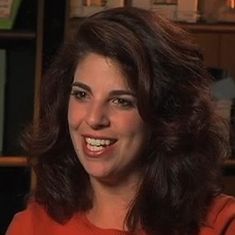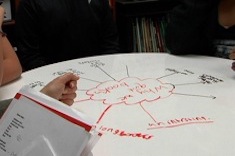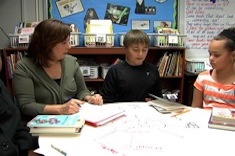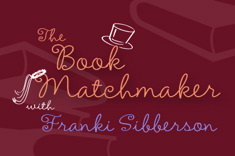Early in the year, like many teachers across the country, I work diligently to teach and reteach my students how to choose a just-right book. We review the parts of the book that give us information about it. We look at how to preview a book and how to tell if it’s too difficult. We practice identifying authors we enjoy and the genres of books we like best. We spend this precious class time on these procedures, because as teachers who are readers, we know that unless you have a good book in your hands, you’re not going to read it.
Yet, despite my best efforts, I have those drive-thru readers who pick and abandon books faster than you can order a McDonald’s hamburger. When I ask students why they have quit their book, they often respond that it’s boring. It’s boring because they can read it but they don’t understand it. Cris Tovani in I Read It, but I Don’t Get It addresses reasons why upper grade students may get stuck and end up abandoning books:
* They lose track of the characters as they come up again in the story.
* They get confused by the format or structure of the text.
* They fail to recognize when the setting or narrator has changed.
Each of these reasons is a starting point for a minilesson or guided reading group topics. It’s going to take me time to teach students about this. But it’s already driving me crazy now during the first week of school seeing kids read a title out for status of the class on Monday and a different title Tuesday and a different one Wednesday. Instead of developing the habit of reading complete books, they’re developing a habit of abandoning ‘boring’ books.
The Drive-Thru Reader in the Mirror
During the first week of school, I sat down with a student who had a reputation of abandoning books. A reputation, I might add, that she was proud to have. On Meet the Teacher Day, she introduced herself and told me, “I’ve made it through third grade without finishing a book. I bet I won’t read one in fourth either.” If that’s not a challenge, I don’t know what is. It was like she was daring me to try and make her read. I simply said, “I didn’t read an entire book until I was 21. I know all the tricks of the trade. And I think it’s the saddest part of my life having missed out on books for so long. I hope that doesn’t happen to you.”
It wasn’t quite how I had envisioned a first encounter with a student on Meet the Teacher Day, and somehow I don’t think my response was what Denise had wanted. But it’s true; it was 21 years before I found the joy of reading that the rest of my family had experienced for so long. I was a master at reading deception when ‘finishing’ books, and no one seemed to know what to do about it. Although, I knew Denise had met her match with me, I also knew it would take me time to teach her the skills to carry a text through to its conclusion. I needed to enlist the help of the other students who knew finishing a book was cool.
Gathered around me, my students had their books and notebooks in hand. “Boys and girls, I notice that most of you are reading the same book as yesterday.”
“Well, it takes awhile to read a good book, Ms. B.,” replied Darren.
“Absolutely. I’m glad none of you have abandoned or stopped reading your books yet,” I replied.
“Good, because mine is over 300 pages. I’m reading the first Harry Potter book and it’s going to take awhile,” said Dwayne.
“I want all of you to take as much time as you need to finish books you start. I’m impressed that you’re not abandoning books. I’m wondering what keeps you reading the book you’re reading?”
There are times that fourth graders don’t want to be rude, but their facial expressions led me to believe they were thinking I’m a bit simpleminded. Patiently they started to explain:
“Ms. B. I have read all of the Magic Tree House Series. If she comes out with more, I’ll read those too,” volunteered Charlene.
“I like books with short chapters. If the chapters are too long, I lose track of what’s going on,” said Rena.
“Rena has a point. James Patterson, who writes for adults, has figured out the same thing. He writes short chapters and I like that,” I affirmed.
“In some books, I forget where I am and think I’m there. That keeps me reading when things get dull,” said Chloe.
“I can relate to that. One of my favorite novels, The Last of the Really Great Whangdoodles by Julie Edwards, is boring at the beginning. But, after the first 50 pages, it’s so good I can’t put it down,” I said.
“I usually give a book 80 pages before I decide to abandon a book. Sometimes an author needs to warm up,” Tremaine added.
“Okay, it seems like we’re all thinking about how and why we keep reading a book until it’s finished. Take a moment to jot down your ideas in your reading notebook.” And with that, they are off to write:
What keeps me reading are snake books. I like them because I can learn more about them. I like them because when I went to the Atlanta Zoo, I saw the big anaconda, that’s how I started loving them. Shayne
I’m not sure what keeps me reading. It might be the excitement and the problems. It might just be that I have to read for 20 minutes every night. It might be that the fact of watching tv and playing too much video games scares me into reading boring books. Or it could be the main idea, and it could be the back of the book, because I always read the backs or flaps about books. I’m not really sure what keeps me reading. It could be I just love to read or it could be all of the above . . . Anna
What keeps me reading usually is the story, because I always read the back. Sometimes I read a book’s first couple of pages and see if I like it so far. If I know the author, I’ll keep reading because I trust him. Sometimes if someone recommends the book, I might read it. I abandon a book if it is really boring after the first 80 pages or so. If I really like a setting or the characters, I will read the book. Jared
What keeps me reading . . . I read the table of contents to see if there might be any interesting chapters I might want to read. If 5 or more chapters are interesting, I will choose that book to read. Another way is how many pages. Why? Well, because if it is a good book, I don’t want it to be too long like seven-hundred pages long. I would like it to be one-hundred to two hundred. What keeps me reading is what type of book it is. If it is a mystery, adventure, scary or action book, I’ll like it. Sal
What keeps me reading is when in the middle something happens and I want to keep going to see what happens. If the first few pages are good, I keep reading. If the middle starts to get boring, then I sometimes keep reading to see if it gets better. If the beginning is good, I keep reading. If the middle is boring and good, I read a little bit more and then decide. If it’s good, then I definitely keep reading. If the book has really short chapters, I keep reading. If I like the characters, I keep reading. If someone recommends it to me, then I’ll read it. If I like the author, I keep reading. Jeremy
What Keeps Me Reading by Chloe
* when someone recommends a book
* the history of the book
* word choices
* the way the words are written
* long chapters
* no chapters
* trust the author
* read the back
* characters that interest me
Just from this kind of entry, I’ve learned a lot about what my students already know. They know to pick books about things they love. They know to read books by authors they like. They know that sometimes a book may seem boring, but they read on because it usually gets better. They choose books that seem manageable. They know the characters matter.
It’s the beginning of the year and they’re talking about choosing the right book. Using this same kind of strategy to revisit what keeps them reading later in the year, the responses are likely to evolve to connect more to the reading strategies they’re learning to use.
Strategy Lesson: What Keeps You Reading?
Purpose: To identify personal reasons why a student reads and what motivates them to finish a book.
How: Recognize students for taking more than a day to read a book. Talk about how a book might last several days or even a week as you read a little each night. Ask the students what keeps them reading a book instead of abandoning it. Keep track of initial ideas on chart paper before sending students off to write.
Extensions: Revisit this mid-year and toward the end of the year to see how students evolve in their approach to finishing books. Read about why authors read — many authors have websites with that information. Students can find out why their favorite author reads, and what keeps them motivated during a long book.









